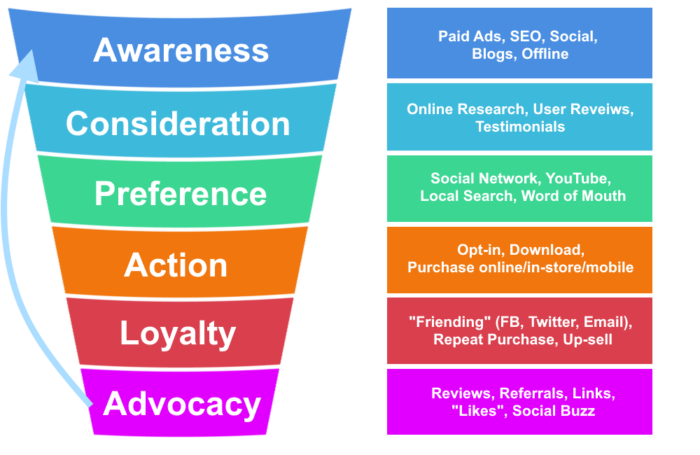- Blog Home
- Content Marketing
- Kevin O'connor
- 7 Ways To Gain Your Audience's Trust Through Content
7 Ways to Gain Your Audience's Trust Through Content

As Doug Kessler said, Creative Director and Co-founder of Velocity, "Traditional marketing talks at people. Content marketing talks with them," which is exactly why you need to consider the quality of the content you publish.
One of the main goals of content marketing is to provide your audience with valuable, relevant content. As you begin to build your reputation as a credible resource, you will build trust and loyalty, which will translate into higher conversion rates.
In contrast, if you do not aim to gain your audience's trust, the opposite effect may occur. As reported in a loyalty study, 43 percent of subscribers left their provider company when they lost trust in the brand. That is why it's so important to not only build a positive, trusting reputation but also maintain that reputation — and content helps you do just that.
Aiming to create brand awareness while building trust?
If so, remain mindful of the following seven tips.
1. Create free (valuable) content
Whether you're providing your audience with educational posts, tips and tricks, inspiration, or unique ideas, the goal is to stand out and build trust. To do so, you need to offer content that provides value, rather than pushing a product or service.
To begin, this content should be free and highly accessible — no matter how valuable it is. After all, you'll want to grow your audience as organically as possible. If your long-term goal is to create gated content or push paid ebooks, based on the quality of the content you publish, once again, it all starts with trust. If readers trust that they'll get something out of it, they'll be more willing to pay — especially if you stand out among competitors.
A classic example of this would be the New York Times' subscription-based model. This was not an overnight development. It took decades for them to build loyalty and trust among their audience. Quality is everything and people are willing to pay for content that is of value to them. However, you need to prove that your content is worth purchasing before you put a monetary value on it, and that takes time.
2. Write content that is accurate
One thing is certain — your audience is drowning in content, most of which is less than great. As reported by DOMO, 2.5 quintillion bytes of data are generated per day, yet only 12 percent of marketers create content with specific targets, customers, or industries in mind. Yikes!
For those who aren't taking their content marketing strategy seriously, there's a good chance that the content they publish is less than satisfactory. If you're striving to improve the quality of your content, accuracy is imperative, especially when it comes to audience trust. Before you publish content online, be mindful of the following:
- Are you able to back the claims you make?
- Know your sources, as let's face it, not all sources online are created equal.
- When you do link to relevant research, find the original source.
When you work with an expert writer, accuracy comes naturally. Professional writers take great pride in their work and understand how to source reliable facts, data, and research.
3. Interview experts and influencers
Whether you're in the healthcare industry or tech space, there are already many well-established experts and influencers out there. Why not leverage their experience, knowledge, and online presence in order to provide your audience with information they can trust? This is also a great way to cross-promote and network.
As a result, you will get links from trusted sites, get visitors from the expert's large audience, form beneficial relationships, and much more. The best way to tackle this is to do your research, interact on social media, and then reach out. BuzzSumo is a great tool to see who is sharing hot topics that you identify with.
4. Make it your goal to influence
While it's beneficial to partner with influencers, ultimately, you want to be the one influencing your audience. When your audience reads your blog or social media posts, for example, the content you publish should make an impact. If you're able to consistently achieve this, building trust will take minimal effort.
The basis of this strategy is your ability to form meaningful relationships. As Andrew Davis said, "Content builds relationships. Relationships are built on trust. Trust drives revenue." This is why you should lead with the needs of your audience members in mind. What do your audiences want to read about? Once you answer this question, you can then create content and build resources around such topics.
This is where data insights come into play. In addition to becoming a trusted source, the more relevant your content is, the more your approach will contribute to optimal search results, generating leads while building brand awareness.
5. Remain transparent
It's important to let your audience in. Let them see who you are in terms of your brand and overall journey. Transparency is so important, which is why you should share your success stories (and hardships), communicating directly with your audience. They want to see that you're human, not a robot.
The key here is to embrace authenticity. Don't be something you're not, it will come off as fake. Be authentic. If you do that, everything else will come quite naturally. How you personally show transparency will depend on your business. However, some examples are:
- Disclosing figures associated with your revenue and overall growth
- Sharing how a certain product is made
- Discussing key business milestones
- Offering honest information about a problem or issue your business faced
- Highlighting real people on social media, such as your employees or customers
6. Speak with your target audience
As Laura Holloway said, "Storytelling offers the opportunity to talk with your audience, not at them." There's a significant difference and these days, your audience understands that difference.
When you create content, it provides you with an opportunity to speak with your audience in a way that is professional, yet personable. Remember, just as much as your audience needs you to provide valuable content, you need them just as much. That is why you should communicate with those who support your brand and content, instead of talking at them.
It's also important to show interest in your audience. For example, if your audience leaves comments on social media, comment back. Once again, this shows the human side of your brand or business — it shows that you care. Nothing is more honest and raw than connecting with audience members one-on-one.
7. Be consistent
Not only should you be consistent in terms of when you publish content, but also how your content appears across your brand. For example, do your blog posts match your social media presence, in addition to your mission statement, white papers, and all the other content you produce?
How you present yourself online will dictate how your audience and customers perceive you. If you are consistent, this will allow you to naturally build trust. After all, when your content wavers in terms of quantity, quality, or schedule, this can be confusing to customers — and unfortunately, confusion can lead to distrust.
Source: Business2Community
Best of all, consistency will support your bottom line. It's been found that consistent brands are worth 20 percent more than those who publish inconsistent messaging.
When it all boils down, as long as you stay true to your brand and adhere to a quality content marketing strategy, audience trust will result. Implement the seven best practices above and continue to work with highly-vetted writers. If you're looking to build a stacked team of writers, be sure to take advantage of your free Scripted trial today!
Published by Kevin O'Connor on Friday, August 14, 2020 in Content Marketing, Hire Content Writers, Trust.


